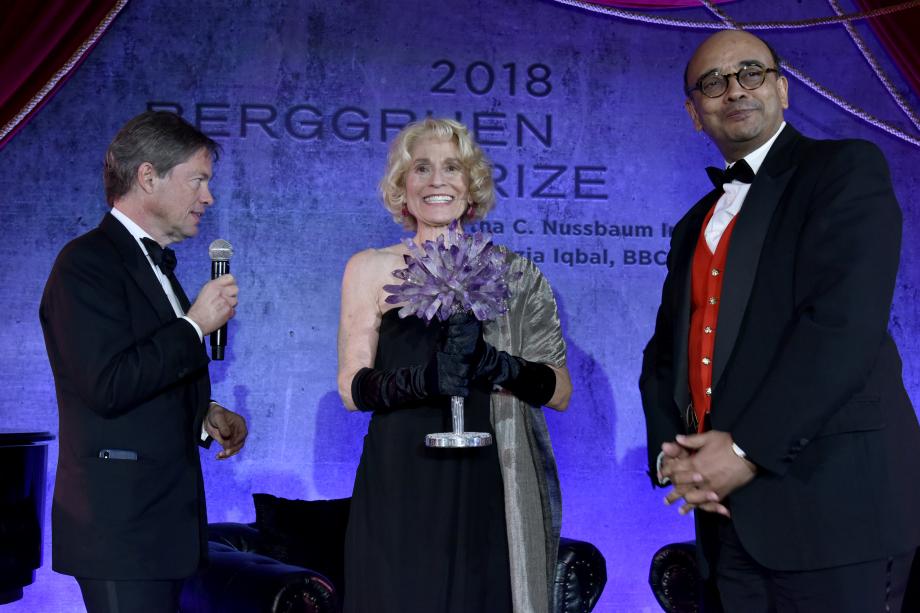Professor Martha Nussbaum Endows Student Roundtables to Support Free Expression

Martha C. Nussbaum, the Ernst Freund Distinguished Service Professor of Law and Ethics, has made a generous gift to support roundtable discussions at the University of Chicago Law School, focusing on issues that can be challenging and often polarizing. Nussbaum’s gift comes from the award of the 2018 Berggruen Prize for Philosophy & Culture, which she received in December.
The popular roundtables, which were started last year, bring together students with faculty who have differing views to seed a rigorous and nuanced discussion and promote the values of free expression and open discourse. Going forward, the roundtables will be known as the Martha C. Nussbaum Student Roundtables.
"These roundtables, first tried out last year, are an ingenious way of addressing the serious problem of student political polarization,” Nussbaum said. “Because polarization affects class selection, it is difficult to address the problem even in a class designed to do just that. But a noontime roundtable represents a small investment of time, and can entice students with divergent viewpoints to come together in the presence of two contrasting faculty members to confront a political or social issue.”
At the roundtables, two faculty members choose a topic, usually a current legal controversy, and invite students to discuss that topic over lunch. The faculty introduce divergent viewpoints and then invite the students to broaden the discussion with their own viewpoints. Topics have included government regulation of the internet, reforming the NCAA, immigration, and bail reform.
“We started the roundtables in response to a problem in the general culture, which has been creeping into universities—that of polarization,” said Tom Ginsburg, Leo Spitz Professor of International Law, Ludwig and Hilde Wolf Research Scholar, and creator of the Nussbaum Roundtables. “Our Law School faculty culture has a long tradition of vigorous debate, but we were concerned that we weren’t providing enough opportunities for students to have the same experience.”
Nine roundtables were held in the first year. The discussions are limited to eight to 12 students, and often are oversubscribed. Four have already been held in the current school year, with at least six more planned.
“Too often we do not talk across political divides, which allows us to demonize the other side,” Ginsburg said. “But we also have decades of social science research that tells us that deliberation in person has the capacity to change views. At a minimum, it is humanizing, but it also has the possibility of generating new ideas that no individual participant may have held before they entered the room.”
Nussbaum has led two roundtables since the program began: one on #MeToo with Professor Adam Chilton last year, and one entitled “Whose Wedding Cake?: Antidiscrimination and Religious Exemptions” with Professor William Baude in October. She and Baude are currently planning their next one, a discussion of transgender bathroom issues scheduled for April.
“I was both impressed and moved by the seriousness, civility, and acuteness of the students, their capacity to listen, and their willingness to seek consensus,” Nussbaum said. “So I decided to use my gift to underwrite that program going forward."
Nussbaum’s gift to support dialogue with the goal of broadening discourse and avoiding polarization is very much in keeping with her scholarship and teaching, Ginsburg said. “Martha is a model of our culture of the relentless pursuit of knowledge, and I am thrilled, but not surprised, that she has decided to support this initiative.”
The roundtables support a longstanding commitment at the Law School and across the University of Chicago to free expression and open discourse. This includes the 2015 report of the University’s Committee on Freedom of Expression, which established the “Chicago Principles” that have been adopted by universities across the country.
“Martha is the consummate Law School faculty member in her unflagging engagement with her colleagues and students on both scholarly pursuits and issues of the day,” said Dean Thomas J. Miles, the Clifton R. Musser Professor of Law and Economics. “I am thrilled that she has chosen to provide lasting support for the roundtables, in which she has already been such an enthusiastic participant. I can think of no better way for current and future students to understand and benefit from Martha’s commitment to ideas and our community’s shared examination of them.”
One of the world’s leading public philosophers, Nussbaum’s work has profoundly shaped public discourse, influencing a wide range of disciplines from philosophy and ancient and modern literature to education, economics, and law. The $1 million Berggruen Prize is given annually to “thinkers whose ideas have profoundly shaped human self-understanding and advancement in a rapidly changing world.”
Nussbaum has made previous gifts to the University. Most recently, she used a portion of the Kyoto Prize to establish the Ernst Freund Fellowship in Law & Philosophy, an award given annually to a student from either the Law School or the Department of Philosophy.
A full schedule of the 2018-2019 roundtables may be found at https://www.law.uchicago.edu/law-school-roundtables.

